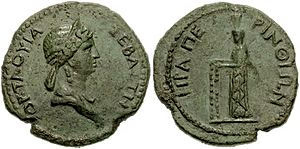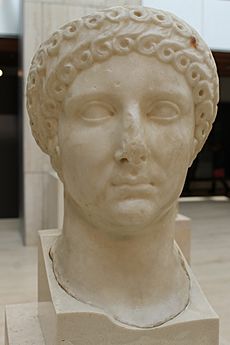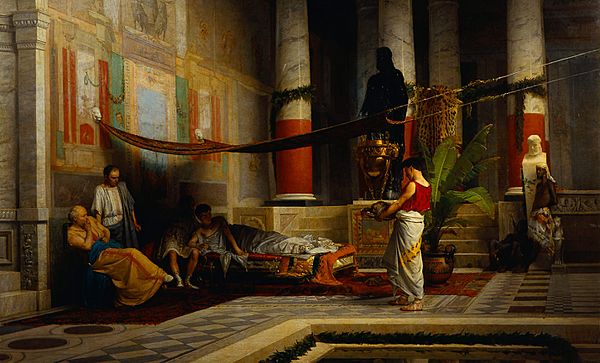Claudia Octavia facts for kids
Quick facts for kids Claudia Octavia |
|
|---|---|
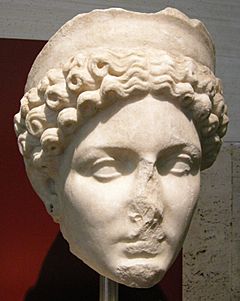
Portrait head of Claudia Octavia, National Museum of Rome
|
|
| Roman empress | |
| Tenure | October 13, AD 54 – June 9, AD 62 |
| Born | late AD 39/early AD 40 Rome |
| Died | June 9, AD 62 (aged c. 22) Pandateria |
| Spouse | Nero |
| House | Julio-Claudian |
| Father | Claudius |
| Mother | Valeria Messalina |
Claudia Octavia (late 39 or early 40 – June 9, AD 62) was a Roman empress. She was the daughter of the Emperor Claudius and Valeria Messalina. After her mother's death and father's remarriage to her cousin Agrippina the Younger, she became the stepsister of the future Emperor Nero. She also became his wife, in a marriage between the two which was arranged by Agrippina.
Octavia was popular with the Roman people, but Nero hated their marriage. When his mistress, Poppaea Sabina, became pregnant, he divorced and banished Octavia. When this led to a public outcry, he had her executed.
Contents
Life
Family
Octavia was the elder of two children of Claudius and his third wife, Valeria Messalina. Her younger brother was Britannicus. She had older half-siblings through her father's earlier marriages. Her elder half-sister was Claudia Antonia, Claudius's daughter through his second marriage to Aelia Paetina. She also had a half-brother, Claudius Drusus, through Claudius's first marriage to Plautia Urgulanilla, although Drusus died before she was born.
She was named for her great-grandmother Octavia the Younger, sister of the Emperor Augustus.
Early life
She was born in Rome around 39 or 40 during the reign of her cousin Caligula. In January 41, Caligula was assassinated and her father was declared emperor. Shortly after Claudius' accession to the throne, her brother Britannicus was born on February 12. That same year, Claudius betrothed her to Lucius Junius Silanus Torquatus, a descendant of Augustus.
In 48, Messalina was engaged in an affair with the senator Gaius Silius, and the two held a wedding banquet when Claudius was away in Ostia. Claudius was informed by one of his advisors, the freedman Narcissus, and hurried back to Rome, concerned that the wedding was part of an attempt to overthrow him and make Silius emperor. Octavia and Britannicus were sent out to meet Claudius in an attempt to assuage his anger. Messalina's efforts to reconcile with Claudius were unsuccessful, and she was executed by the Praetorian Guard on orders that Narcissus presented as being from Claudius.
Claudius' remarriage and the rise of Nero
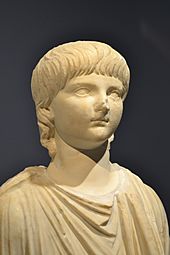
Political concerns, including the need to dissuade further challenges to his legitimacy, motivated Claudius to remarry. Several candidates were proposed by his advisors; they included his former wife Aelia Paetina and Lollia Paulina, a wealthy noblewoman who had been married to Caligula for a short time. In 49, Claudius instead married Agrippina the Younger, daughter of the popular general Germanicus and also a descendant of Augustus. Germanicus was Claudius' older brother, making Agrippina Claudius' niece and Octavia's first cousin. The law prohibiting such a marriage was changed in order to proceed.
Agrippina had a son, Lucius Domitius Ahenobarbus from her first marriage to Gnaeus Domitius Ahenobarbus. In 50, Claudius adopted Lucius, who changed his name to Nero Claudius Caesar Drusus Germanicus. Agrippina played an active role in politics through her influence on Claudius.
Life as empress
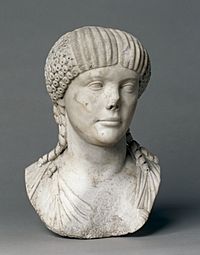
On October 13, 54, Claudius became ill and died unexpectedly. The convenient timing of his death – Britannicus was rapidly approaching adulthood and might displace Nero as heir – led the ancient sources to accuse Agrippina of killing him. Although modern historians consider the death suspicious and Agrippina possibly guilty, they also note that Claudius was in his sixties and never in the best of health. On the same day, Nero was acclaimed emperor by the Praetorian Guard, and the senate acquiesced, formally investing him with power. Octavia was now married to the emperor of Rome. Having become emperor, Nero's relationship with his mother began to deteriorate as the two vied for power.
The next year, Britannicus died as well, during a banquet where Octavia, Nero, and Agrippina were all present. Octavia and Agrippina were shocked at Britannicus' sudden illness, which Nero attributed to epilepsy. Britannicus, as the son of Claudius, had been a potential rival for the imperium, one that Agrippina had attempted to use as leverage in power struggles with her son. The suspicious death of Nero's rival led to the widespread assumption that Nero had had Britannicus poisoned; ancient writers including Tacitus, Suetonius, Cassius Dio, and Josephus all charge Nero with the murder of his stepbrother. Tacitus reports that by this point, Octavia "had learned to hide her griefs, her affections, her every emotion".
Octavia and Agrippina grew close after the death of Britannicus. Nero's expressed desire to marry one of his mistresses resulted in another conflict in the ongoing power struggles between Nero and Agrippina. These came to an end in March 59 when Nero, possibly at the urging of Poppaea, murdered his mother, doing so with the assistance of Anicetus, a former tutor of Nero's who had become an admiral.
Octavia was well-liked by the Roman populace, but her marriage to Nero was loveless and unhappy. Although Tacitus describes Octavia as "a noblewoman of proven virtue" and having a "modest demeanour", Nero had no interest in her and hated their marriage. When some in the court raised questions about his treatment of her, he responded that she should be content to be his wife in name only.
In 62, Nero no longer had the chief advisors of his early reign, as praetorian prefect Sextus Afranius Burrus died, and Seneca the Younger retired. This led to a shift in Nero's conduct that historian Barry Strauss referred to as "a turning point in the reign", as he increasingly exiled or executed those he considered his enemies. Burrus had previously advised Nero against divorcing Octavia. He positioned Nero's marriage to her as the source of his legitimacy as emperor, telling Nero that he would need to "give her back her dowry". The same year as Burrus' death, Poppaea became pregnant with Nero's child.
Divorce, banishment, and death
Nero divorced Octavia, claiming she was unable to bear a child. As part of the divorce, he gave her properties previously belonging to Burrus and Rubellius Plautus, another Julio-Claudian relative he had recently had killed. Nero married his mistress Poppaea shortly after – in Suetonius' account, twelve days after the divorce.
Nero and Poppaea unsuccessfully tried to damage Octavia's reputation and exiled her to Campania. The people of Rome responded to Octavia's banishment with widespread public protests that historian Vasily Rudich described as "the most pronounced mass disturbance [in the city of Rome] under Nero until the very moment of his overthrow". The protests were largely against Poppaea; Nero was even cheered when rumors spread that he had changed his mind. Statues of Octavia were carried through the streets, while those of Poppaea were pulled down or damaged.
Nero was unsure how to respond. Poppaea argued for harsher treatment of Octavia, claiming that the protesters were simply Octavia's clients and servants and did not really represent what the Roman populace thought. She also suggested that any husband found for Octavia could be a threat to his position.
Octavia was exiled to the small island of Pandateria (now Ventotene), where Julia the Elder, Agrippina the Elder, and Julia Livilla had all previously been exiled. A few days after her arrival, soldiers arrived with the order to execute her. Her entreaties with her executioners were unsuccessful, and she was catured and killed. She died on June 9, 62.
In fiction
Her divorce from Nero is the subject of the play Octavia, the only example of Roman drama based on Roman history to survive in its entirety. It was written by an unknown author after Nero's death, possibly during the rule of the Flavian dynasty, and may have been the first written accusation that Nero was responsible for the Great Fire of Rome.
Beginning in the 17th century, there was an increase in operas and other dramatic works based on the life of Nero. The Octavia was likely an influence on some of these works, although to what extent is unclear. Octavia appears in works including Handel's lost opera Nero, Claudio Monteverdi's opera L'incoronazione di Poppea (1642/1643), Reinhard Keiser's opera Octavia (1705), Vittorio Alfieri's tragedy Ottavia (1783), and Johann Caspar Aiblinger's ballet La morte di Nerone (1815/1816). Some works took considerable creative liberties with the historical events, such as Giovanni Battista Bassani's Agrippina in Baia (1687), which contains a happy ending where all the characters survive and are successfully reconciled with each other.
Octavia is also the subject of the massive German novel Die Römische Octavia (1677-1707) by Anthony Ulrich, Duke of Brunswick-Wolfenbüttel, and a character in Robert Graves's novel Claudius the God (the sequel to I, Claudius) and the television series I, Claudius. She is the main character of the historical biographical novel Octavia: A Tale of Ancient Rome by Seymour van Santvoord (1923).
See also
 In Spanish: Octavia para niños
In Spanish: Octavia para niños
- Julio-Claudian family tree


